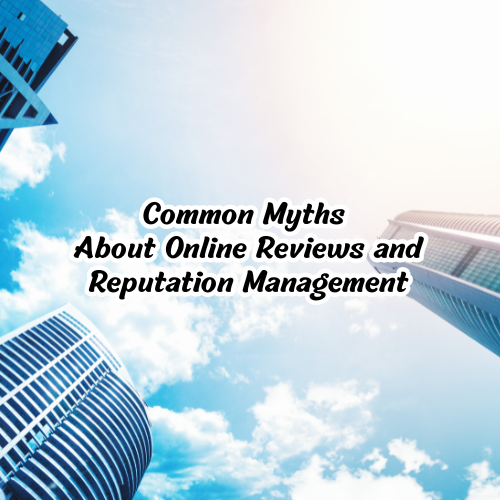If you're an online business owner, mostly revolves around your online reputation. Whether you operate a small business or a global organization, what people see when they search for your brand may determine your success. This is where SEO reputation management comes into play. It's not enough to just manage reviews and respond to customer feedback; you should also actively affect how your company appears in search engine results.
In this blog post, we'll go over the significance of SEO reputation management, how it affects your business, and practical tactics to ensure your brand stands out for all the right reasons.
What is SEO Reputation Management?

1. First Impressions Are Digital
According to Hubspot, 75% of visitors never scroll beyond the first page of search results. If your brand's first page is crowded with nasty reviews, old news, or useless material, you're already losing clients.
2. Trust is Built Online
Customers place equal confidence in online reviews as they do personal advice. An effective SEO reputation management plan prioritizes positive reviews and testimonials, fostering trust among potential clients.
3. Competitive Advantage
In saturated markets, your online reputation might help you stand out. A well-managed reputation not only draws clients but also allows you to outperform competitors in search results.
4. Crisis Prevention
Negative information may spread rapidly. Proactive SEO reputation management enables you to identify and fix issues before they worsen, therefore keepinh your brand from long-term harm.
Key Components of SEO Reputation Management

To properly manage your online reputation, you should focus on the following fundamental components:
1. Search Engine Optimization (SEO)
SEO is one of the foundations of a strong reputation management. You may influence how your website and content appear in search results by optimizing them for relevant keywords. This includes:
- On-page SEO involves optimizing meta tags, headers, and content.
- Off-page SEO involves creating backlinks and increasing domain authority.
- Local SEO: Making sure your business appears in local search results and maps.
2. Online Reviews
Reviews are an important aspect of both reputation management and local SEO. Encourage pleased consumers to provide good reviews on platforms like as Google, Yelp, and industry-specific websites. Respond to all reviews, favorable and bad, to demonstrate that you respect consumer input.
3. Content Creation
High-quality content is an effective strategy for shaping your online reputation. Create blog pieces, case studies, and press releases to highlight your company's qualities and accomplishments. This material may rank in search results, pushing down negative information.
4. Social Media Presence
Your social media profiles can increase your visibility in search results. Keep them current, professional, and in line with your brand's messaging. Engage with customers on social media and openly address any issues.
5. Monitoring and Analytics
You cannot manage what you do not measure. Use Google Alerts, Reviewr, and other reputation management tools to track brand mentions and development.
Useful Techniques for Successful SEO Reputation Management

Now that you've learned the value of SEO reputation management, let's look at some practical techniques to assist you in taking control of your online presence.
1. Claim and Optimize Your Online Profiles
Begin by claiming your company profiles on major sites such as Google My Business, Yelp, and industry-specific directories. Make sure your profiles are thorough, correct, and optimized for relevant keywords.
2. Encourage and Manage Reviews
Actively encourage satisfied customers to submit reviews. Make it easier for them by including direct links to your review profiles. Respond to all reviews—thank customers for positive feedback and answer negative ones in a professional and compassionate manner.
3. Create High-Quality Content
Create a content plan that highlights your brand's strengths while addressing frequent customer issues. For example:
- Write quality blog pieces that respond to frequently asked questions by your target audience.
- Share client success stories and testimonials
- Make press releases for noteworthy accomplishments or milestones.
4. Build a Strong Backlink Profile
Backlinks from credible websites might help you increase your domain authority and search rankings. Reach out to industry blogs, news sites, and influencers to get backlinks to your material.
5. Leverage Social Proof
Display positive feedback, testimonials, and case studies on your website and social media pages. This not only increases confidence but also creates new information for search engines to index.
6. Monitor and Address Negative Content
Monitor brand mentions on the web. If you uncover any bad content, take action to address it. This may involve:
- Responding to negative reviews in a solution-oriented manner.
- Requesting removal of false or defamatory information.
- Creating positive conten to outperform bad results.
7. Invest in Local SEO
Local SEO is also a goldmine for local businesses to increase visbility and build strong reputation. Optimize your Google My Business profile, use location-specific keywords, and make sure your NAP (name, address, phone number) is consistent across all platforms.
8. Engage with Your Audience
Engagement is key to developing a great reputation. Respond to social media comments, join online conversations, and demonstrate that you value your audience's perspectives.
The Long-Term Benefits of SEO Reputation Management

Investing in SEO reputation management is more than simply addressing problems; it's about creating a strong, trustworthy brand that will last. By continuously monitoring and enhancing your online presence, you can:
- Attract more clients and increase income.
- Create long-lasting ties with your audience.
- Stay ahead of your competition in search rankings.
- Protect your brand against future catastrophes.
Final Thoughts
Your online reputation is among your most significant assets. With the correct SEO reputation management plan, you can guarantee that your brand is positively viewed, appears high in search results, and stands out in a competitive market.
Are you ready to take charge of your online reputation? Begin by assessing your present presence, applying the methods indicated above, and using tools such as Reviewr to keep on top of your game. Remember, a great reputation does not happen overnight—but with constant effort, the outcomes will speak for themselves.
By emphasizing SEO reputation management, you are not only protecting your brand but also positioning it for future success. So what are you waiting for? Start today!









